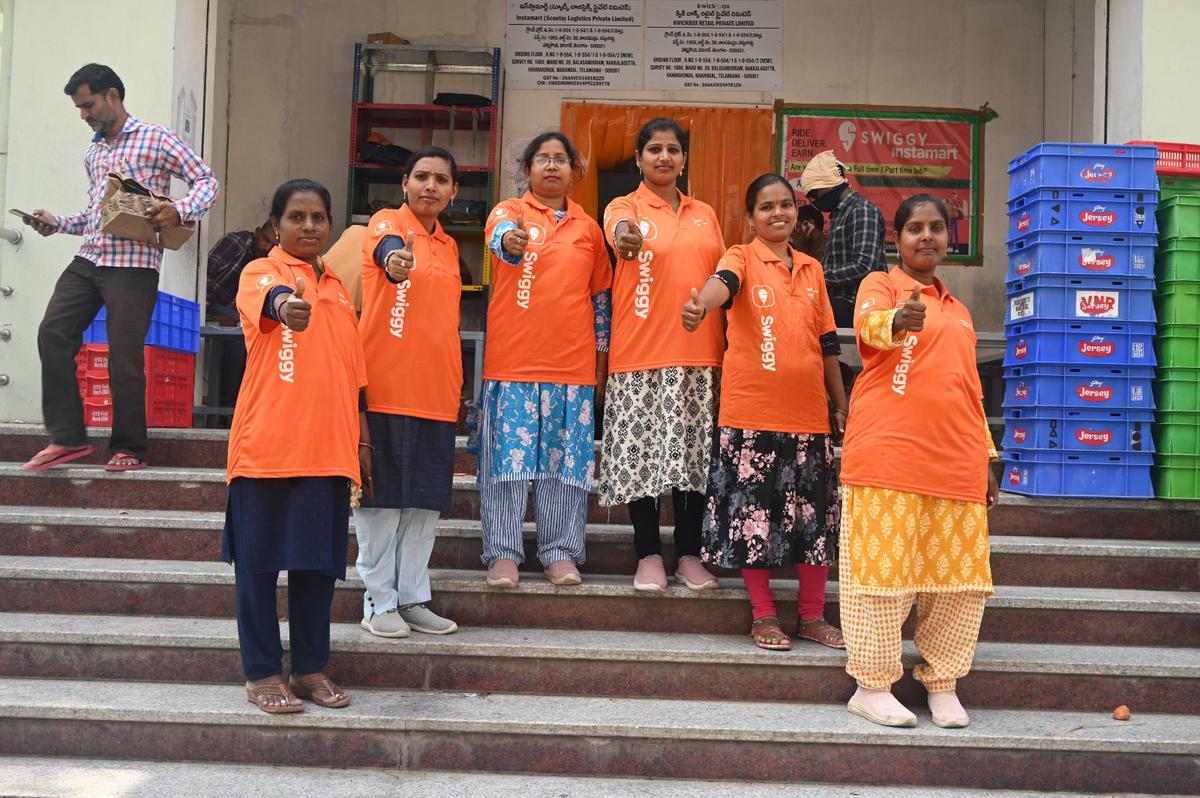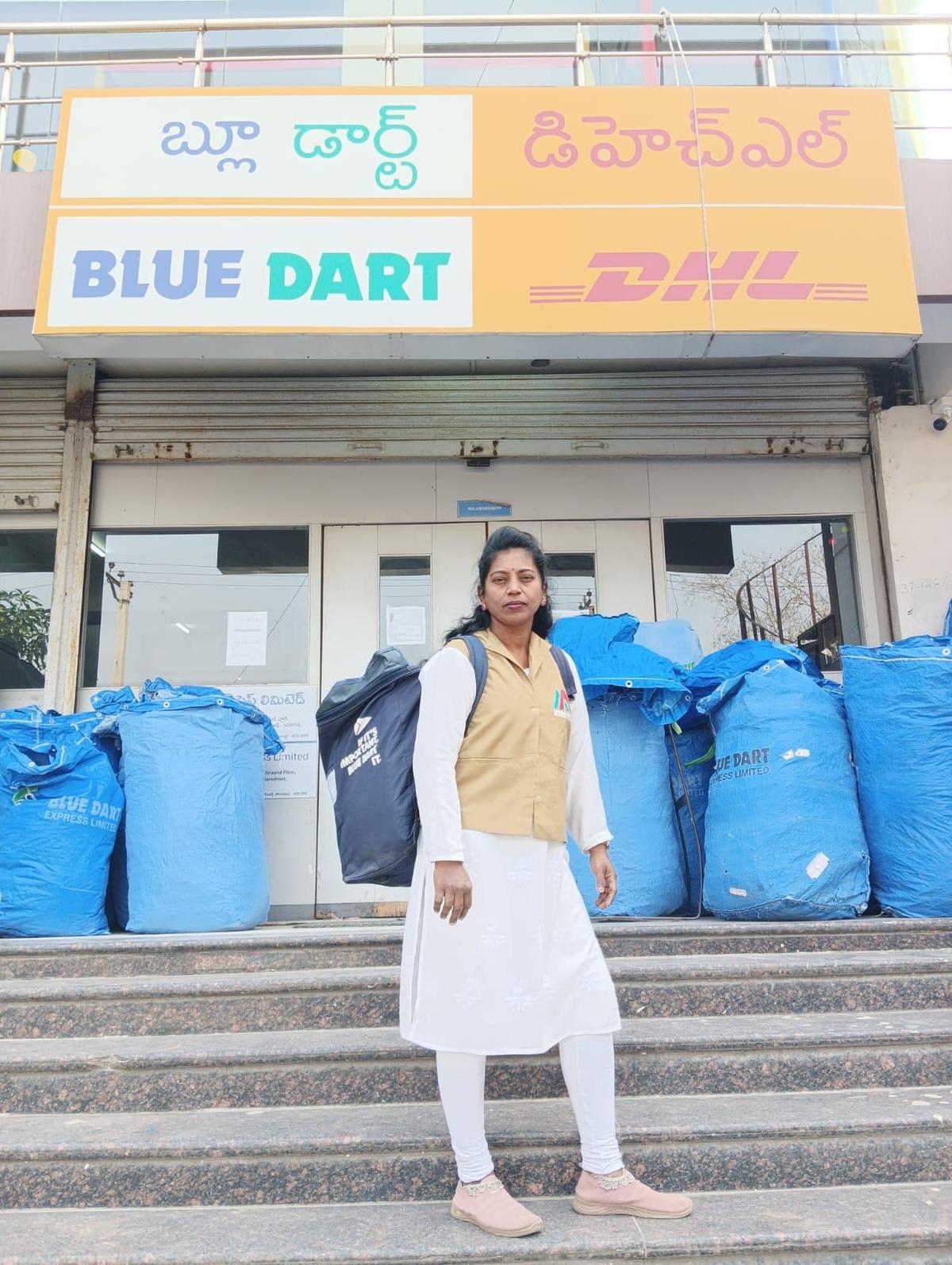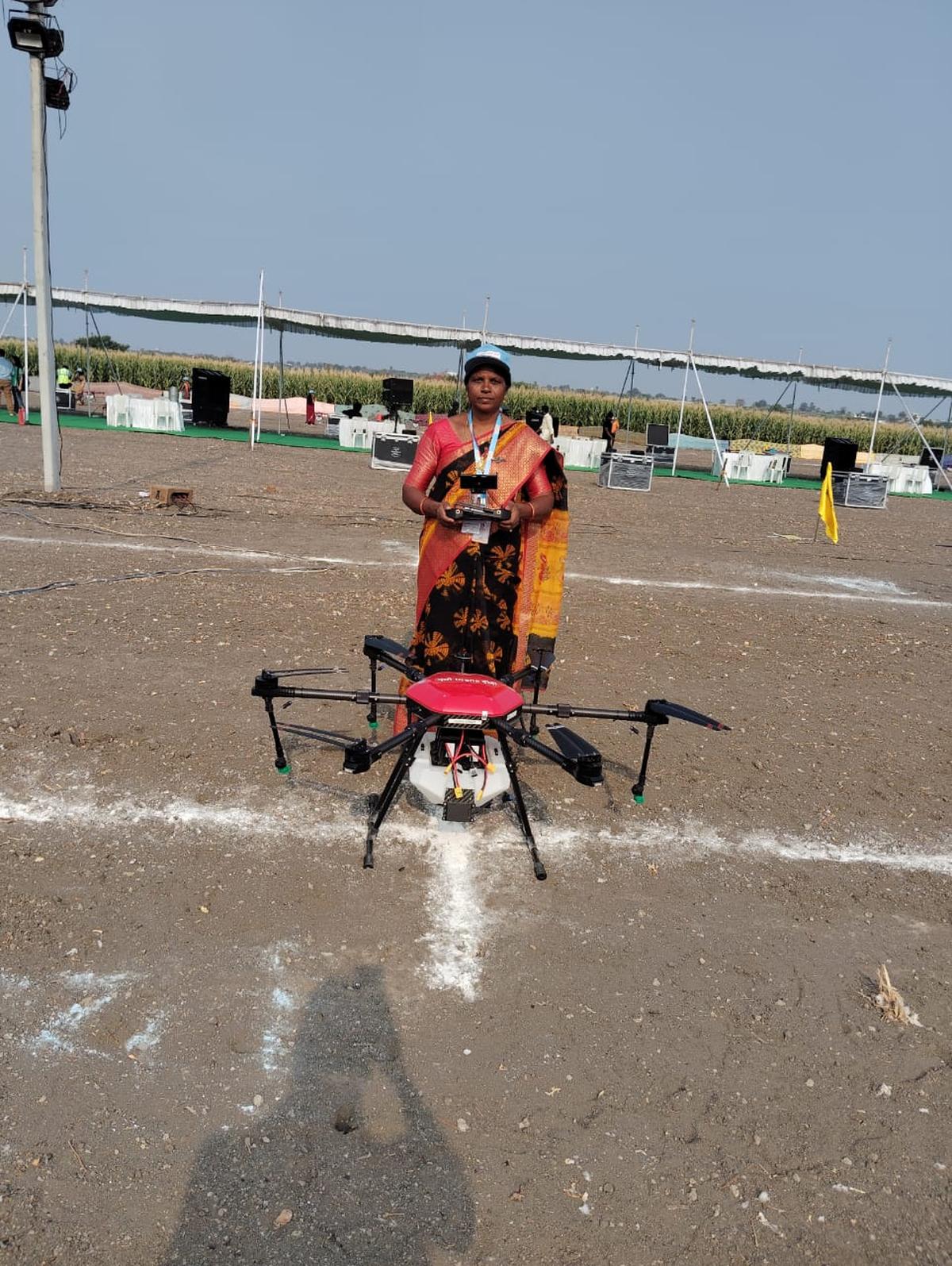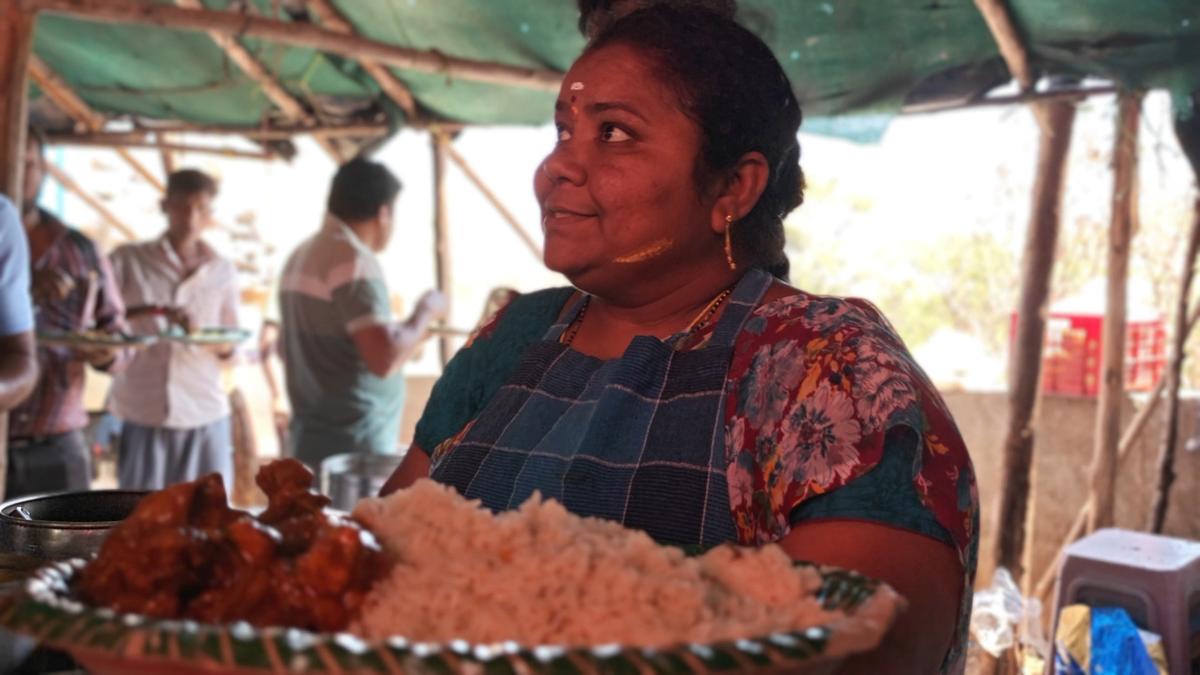From stalls of sizzling street food to steering autos, from delivering parcels to piloting drones over farms, women in Telangana are rewriting the rules of work. Breaking free of domestic spaces, they are now thriving as entrepreneurs and tech-savvy farmers, transforming their lives and perceptions of society.
Every morning by 8.30 a.m., Srimala Swapna is already on the road. She leaves her home in Parvathagiri village in Hanamkonda district, having packed lunch for her children and sending them off to school. Her husband, a daily wage labourer, heads out for work. She begins her own journey to Hanamkonda’s Swiggy Instamart hub, about 60 km away.
“People here are surprised to see women delivery agents,” she says. “Until two months ago, I was just a homemaker, but I always wanted to work.”

Srimala Swapna (third from left) along with her colleagues after wrapping up a day as Swiggy Instamart delivery executives in Hanamkonda.
| Photo Credit:
ARRANGEMENT
Training under that Moving Women (MOWO), a not-for-profit Hyderabad-based social enterprise working in the area of training women in driving two and three-wheelers, gave her the push. Her workday starts at 10 a.m., picking up deliveries and zipping through the streets until 4 p.m. The commute is long, and her electric scooter sometimes runs out of charge, but she finds fulfilment in completed trips. “The mornings are hectic, but they bring a sense of accomplishment.”

Nagula Sarala from Sainikpuri in Hyderabad, who works as a delivery executive with Blue Dart, records 100-120 deliveries of parcels across the city everyday.
| Photo Credit:
ARRANGEMENT
Nagula Sarala from Sainikpuri in Hyderabad shares a similar journey. For 25 years, her world revolved around her husband, children, and daily rhythm of home life. Married at 19, she never imagined a life beyond home until a social media post led her to try delivery work.
Her first day was rough. A customer’s sharp remark — “Why do you even work when you don’t know the locations?”— shattered her confidence. She almost quit. But encouragement from family and colleagues pushed her forward, and today, four years later, she excels in the field.
Starting with Delhivery.com, then moving to Amazon, she has spent the last two years with Blue Dart. Covering 10–12 km daily and navigating staircases without lifts, she works with precision. Impressed customers have offered her money, but she never accepts. “I did take sweets from a few,” she laughs, “to celebrate their special moments.”
Sarala has seen many women enter the field, only to leave. Since 2022, 15 women have joined alongside her — she is the only one left. “Women think this job is only for men,” she says, “but it’s not. It pays decently for five to six hours of work. It feels odd at first, but you get used to it.”
Matching her male colleagues in deliveries — 100 a day, sometimes even surpassing them at 120 — her dedication has earned her incentives and trust. At 42, she has redefined her life. Her husband, a municipal sanitary supervisor, and her children pursuing MBA, B.Tech, and B.Com degrees, stand by her.
Women auto drivers shift societal gears
As the sweltering Hyderabad sun blazes overhead, Ruksana Begum pulls out her sleek, purple e-auto. It’s Ramzan, and though she is fasting, her determination remains unfaltering. She travels eight kilometres from Attapur to Moghalpura Grounds, a busy auto hub, waiting for her customers.
Ruksana Begum, trained under Moving Women initiative, waiting for customers at Moghalpura Grounds, a busy auto hub in Hyderabad.
| Photo Credit:
SIDDHANT THAKUR
A quiet revolution is unfolding on Hyderabad’s streets. “In the beginning, it was intimidating — navigating traffic, handling customers — but this job has given us more than just an income. It has given us confidence and control over our lives,” she says.
She is among a growing number of women auto drivers trained under MOWO initiative, which provides electric autos, training, and licenses. Drivers rent the autos for ₹700 a day, earning between ₹1,300 and ₹1,500 daily.
“We have some 10 women drivers in Hyderabad now. I want that to grow to 100 in the coming months,” she says.
For many, the biggest draw isn’t just the earnings but the flexibility. “Unlike corporate jobs, we choose our own working hours. Plus, we’re trained in self-defence and handling tricky customers,” says Shahana Begum, a former driver turned mentor for new recruits.
Shahana Begum, who is a mentor for women auto drivers trained under Moving Women (MOWO) initiative in Hyderabad.
| Photo Credit:
SIDDHANT THAKUR
But their vision extends further — a ride-hailing platform exclusively for women drivers and passengers, ensuring safer journeys. “That would be a game-changer,” says Ruksana before zooming off to her next ride.
Women powering tech in rice fields

Chewgoni Saidamma from Kattangur mandal of Nalgonda harnessing drone technology to revolutionise her farming practices, which has helped her cut costs by 30%.
| Photo Credit:
ARRANGEMENT
Telangana’s status as India’s rice bowl is being reshaped by women farmers merging tradition with technology. With a record 153 lakh metric tonnes in 2024, the State retained its top spot. Among those helping this change is Chewgoni Saidamma from Kattangur mandal of Nalgonda, harnessing drone technology to revolutionise her farming techniques.
A single mother raising three children, she took over her fields with a vision — not just to sustain but to thrive. A year ago, she trained as a drone operator and has since cut costs by 30%, increasing her income. The traditional spray method used 120 litres of a water-chemical mixture per acre and took an entire day to complete. Now, a drone with just a 10-litre tank does the job in minutes, saving 91.67% of the solution. With reduced pesticide use, farming has become both efficient and profitable.
“The first time I saw a drone was at a wedding. I wanted to shoot weddings, but I ended up in the farm instead,” she smiles.
Trained under the ‘Namo Drone Didi’ scheme, she is now eager to explore aerial photography. “There’s big money in drone work now. Wedding shoots are far more exciting than regular photography. Learning about camera angles and equipment is my next step,” she says.
About 140 km away in Hyderabad’s Shadnagar, Arts postgraduate Shailaja Amuthanjali is proving innovation isn’t limited to educational background. After a week-long training on drones at Professor Jayashankar Telangana State Agricultural University, she began assisting her father and local farmers by using a drone to spray chemicals, making the process faster, cheaper and more efficient. In a span of just 2-3 months, she and her drone have covered over 100 acres of land in her village.
“Farming used to be hard work — this is smart work,” she says. She’s also preparing for Telangana’s Public Service Commission exams.
Riding the foodpreneur wave
At 12.30 p.m., as the lunch rush begins, a familiar face greets hungry IT employees at the bustling ITC Kohinoor junction in Hyderabad’s IT corridor. Amid a row of male-run food stalls, Dasari Sai Kumari — fondly known as Kumari Aunty — has carved a space of her own, serving plates of steaming home-cooked food that vanishes almost as quickly as it is served.

Dasari Sai Kumari or Kumari Aunty, serving plates of steaming home-cooked food at the bustling ITC Kohinoor junction in Hyderabad’s IT corridor.
| Photo Credit:
Video Grab
Her stall’s fame skyrocketed after a viral YouTube video drew food lovers to her. In just two-and-a-half hours, she sells over 100 kg of chicken dishes and about 10 different kinds of rice.
“I always loved cooking, but this stall has given me a new purpose,” she says and credits her family for standing by her. “Even the smallest ventures can turn into something big if given a chance,” she says.
In another part of the city, Maheshwari’s momo stall has become a new favourite in Amberpet. What started as a homemade treat for her kids turned into a life-changing business when circumstances pushed her to earn a livelihood. “This food stall not only helps me overcome stress and struggle of life, but also allows me to provide for my children, ensuring they can continue their education and live a dignified life,” she said.
As Telangana’s women take the driver’s seat — literally and figuratively — this Women’s Day celebrates their unstoppable journey toward empowerment and economic independence.
Published – March 07, 2025 07:35 pm is






